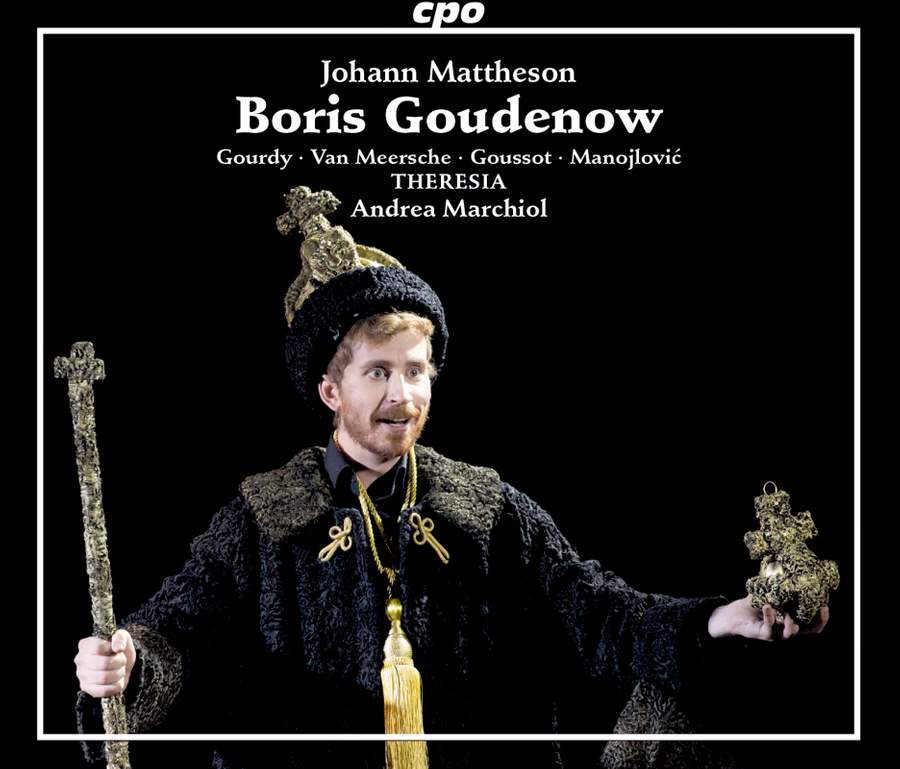MATTHESON Boris Goudenow (Marchiol)
View record and artist detailsRecord and Artist Details
Genre:
Opera
Label: CPO
Magazine Review Date: 03/2023
Media Format: CD or Download
Media Runtime: 149
Mastering:
DDD
Catalogue Number: CPO555 502-2

Tracks:
| Composition | Artist Credit |
|---|---|
| Boris Goudenow |
Johann Mattheson, Composer
Alice Lackner, Olga, Mezzo soprano Andrea Marchiol, Conductor Eric Price, Josennah, Tenor Flore Van Meerssche, Irina, Soprano Joan Folqué, Gavurst, Tenor Julie Goussot, Axinia, Soprano Olivier Gourdy, Boris Goudenow, Bass Sreten Manojlović, Fedro, Bass Theresia Yevhen Rakhmanin, Theodorus Iwanowitz, Bass |
Author: Lindsay Kemp
A Boris by Mattheson? Well yes, and in its way perhaps no less political in aspect than Mussorgsky’s. Johann Mattheson is best known for his extensive writings on music and for being a mentor to the slightly younger Handel, whom he also almost killed in a duel. But as well as being an important figure in German 18th-century music, producing at least eight operas and 32 oratorios, he was also secretary to the English ambassador in Hamburg, and as such must have been one of the few composers who could attempt to further an administrative career in government by writing an opera. According to the booklet note Boris Goudenow, composed to Mattheson’s own German libretto in 1710 and depicting political manoeuvrings surrounding Boris’s accession as tsar (making it a prequel to Mussorgsky), looks like a reflection of shifting international alliances in the Great Northern War by which Mattheson hoped to gain advancement. In the end his hopes evaporated after England declined to join the conflict; the composer-diplomat stayed where he was, and the opera stayed in the cupboard.
Like much of Mattheson’s output it was believed destroyed in the Second World War, but then rediscovered in Armenia in 1998; its first concert performance came in Hamburg in 2005, and a world-premiere staging at the Boston Early Music Festival later that year. This recording was made at a staged production at the 2021 Innsbruck Early Music Festival.
This opera itself turns out to have plenty of quality in it: affecting arias you could easily mistake for Handel (if not Handel at his very best) mix with interesting moments of individuality, achieved with a skill, lightness and grace reminiscent of Telemann. Mattheson likes ensembles and choruses more than Handel (at one point there is even a vocal quartet in strict canon). And while Italian influence is obvious to the extent that some arias actually are in Italian (not unusual at that time in Hamburg), French instrumental style also makes several unmissable appearances, not least in a fine concluding chaconne. It goes without saying that there not an iota of Russian flavour in it.
Musically speaking, the cast of young singers and the baroque youth orchestra Theresia under Andrea Marchiol expose the piece nicely enough without really setting the world on fire. Olivier Gourdy and Alice Lackner make the most enjoyable vocal contributions, and certainly none of the cast can be blamed for what is a troubling standard of production and presentation. One review I read of the performance gave the impression of an insufferable staging, and while that can’t be heard, the fact that one comic character was apparently altered to a speaking role perhaps explains why he has been disappeared altogether on the recording (unnoticed by the synopsis-writer, by the way). This and, I suspect, the removal of applause may well be why there is some irritating and ill-timed editing between numbers. The theatre-dry balance too is a bit makeshift; some singers struggle against the orchestra, and a continuo harpsichord often jangles annoyingly in the right-hand speaker. The English translation of Mattheson’s sententious libretto reads like a first draft and is frankly pretty hard to follow.
It is interesting to hear a Baroque opera that speaks for a tradition slightly apart from the normal Italian run of things, and few will forget the moment when one of the characters complains that ‘Boris is to blame; his doings are pure dishonesty’ – some political allegories, it seems, can have more than one life. This recording, however, is not really strong enough in dramatic coherence, performance or production to give it much appeal as a listening experience to anyone but the buffs.
Explore the world’s largest classical music catalogue on Apple Music Classical.
Included with an Apple Music subscription. Download now.

Gramophone Digital Club
- Digital Edition
- Digital Archive
- Reviews Database
- Events & Offers
From £9.20 / month
Subscribe
Gramophone Club
- Print Edition
- Digital Edition
- Digital Archive
- Reviews Database
- Events & Offers
From £11.45 / month
Subscribe
If you are a library, university or other organisation that would be interested in an institutional subscription to Gramophone please click here for further information.






